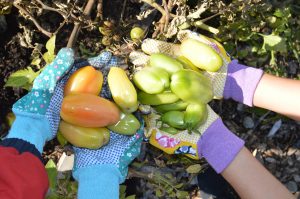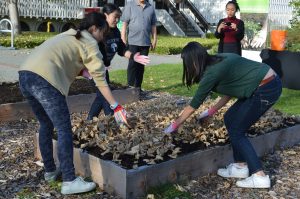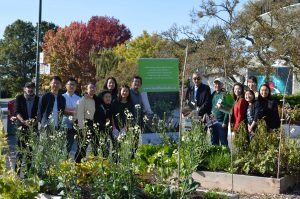Last month, the UBC Initiative for Student Teaching and Research in Chinese Canadian Studies (INSTRCC) hosted a garden harvest celebration event at the Museum of Vancouver (MOV) to celebrate a milestone for the SSHRC Partnership Development Grant (PDG) funded project, “Activating a Multi-sited Museum: an Innovative Organizational Model for Heritage and Community Knowledge-Making.”
This harvest event was the culmination a year’s worth of hard work by UBC INSTRCC research assistants. From initiating a visioning, design, and planning process a year ago, INSTRCC research assistants Jenny Lu, Stephanie Johnson and Winnie Kwan worked with UBC and MOV staff to propose a detailed plan to create an experiential, inclusive, educational, and inviting “spoke” museum exhibit physically located outside current MOV exhibit premises. Centered on the values of encouraging civic engagement for migrant communities in Vancouver using food and gardening, the backyard garden activated an under-utilized public space to draw attention to the MOV’s upcoming Chinese Canadian history exhibit, “A Seat at the Table,” which is scheduled to be open to the public in April 2020.
During the summer, the hard work of planting, nurturing and maintaining this new backyard garden was transferred to a new crop of research assistants, Gillian Chan and Wei Yan Yeong. Tasked with ensuring a successful growing season, both students worked full-time at the MOV to implement the initial vision for the backyard garden.

San Marzano tomatoes harvested by UBC research assistants.
This year-long effort demonstrates how leveraging resources and expertise between institutions can facilitate knowledge mobilization to positively reshape our neighbourhoods and communities. By providing space to bring museum and history researchers, public historians, students, planners, and other stakeholders to the table, this partnership is committed to innovating the way we experience museums for the future.
For many participants, it was their first time doing gardening work in any capacity. Gillian Chan, a 4th year English and Asian Canadian & Asian Migration Studies student remarked that “it was an eye-opening experience for me to see how the vegetables grew over the summer. Understanding the process of urban agriculture from a high-level perspective, while getting my hands dirty in the soil was transformational for my personal and professional development.”

Jenny Lu, Wei Yan Yeong, Gillian Chan and Winnie Kwan with backyard garden bouquets.
Throughout the afternoon, participants learned to harvest crops and assemble “bouquets” made of vegetables such as bok choy, choy sum, napa cabbage, green cherry and san marzano tomatoes. Other crops included Vietnamese coriander, hairy melon, and chives. It was the planning team’s intention to plant popular vegetables for Chinese and Asian Canadian cooking as a way to story-tell the history and impacts of Chinese Canadian farming on our local food system.

Research assistants working to protect existing garden beds from weathering.
Wei Yan Yeong, a 3rd year Soil Science student, taught participants the theory of using cover crops to prepare for the Spring 2020 growing season, and explained the theory of planting crimson clover seeds and garlic cloves to participants: “these seeds will grow into bright red clovers that will protect the soil and support soil nutrition for next spring. Garlic cloves are used because they develop during the winter, and can be harvested in the next year. To protect the soil, the garden bed was covered with dried leaves and a tarp was placed on top.”

Student researchers, staff, and faculty group shot by the Museum of Vancouver backyard garden. October 2019.
Overall, this harvest and planting session was a tangible way for participants to learn about soil conservation, food security, Chinese Canadian history, and museum education in an experiential way. Wei Yan, Gillian, Jenny, Stephanie, and Winnie’s involvement with this project demonstrates the power of interdisciplinary student-based experiential learning. All students had the opportunity to mobilize scholarly knowledge into a local context in the form of the MOV backyard garden.
To learn more about Gillian and Wei Yan’s story through film, watch: [youtube]https://youtu.be/_83J97E1r1I[/youtube]
Thank you to the participants and the professors of UBC (Dr. Rickey Yada, Dr. Henry Yu, Dr. Buncha Chinnasri) for their enthusiasm and taking part in the event. A special thank you to the staff at UBC ACAM, UBC St. John’s College (INSTRCC), and the Museum of Vancouver, in particular Dr. Viviane Gosselin and Alan Kollins, for taking the time out of their busy schedules to provide equipment support and the space for the event.
 Faculty of Art
Faculty of Art